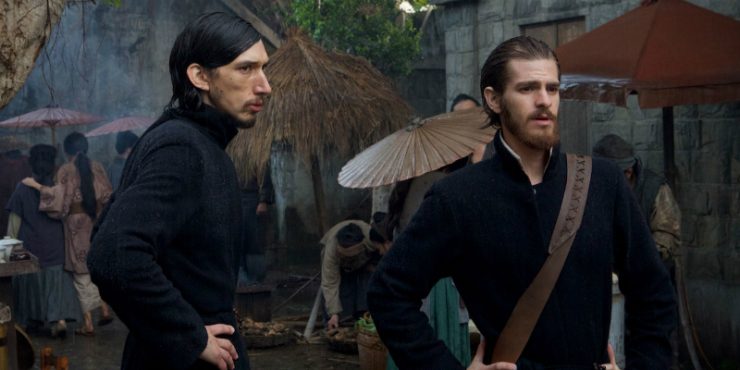Say what you will about Martin Scorsese, and whether or not he still has his fastball, there are still very few directors making studio films on a large scale about harsh, complicated issues. Silence is obviously a film that is very meaningful to the director, himself. It’s been a project he’s been trying to get off the ground since before Goodfellas. As a filmmaker known for his dissections of criminality, an undercurrent of spiritual turmoil has always rumbled underneath the surface, but not since his brilliant 1988 film The Last Temptation of Christ has he directly made a film so thoroughly about the nature of spiritual identity and the emotional hardship regarding Christian faith. Last Temptation (based on the Nikos Kazantzakis novel) was actually about Jesus Christ’s crisis of faith before his public execution. Silence does not reach as high as God’s son for a protagonist, instead it follows the trials of two Seventeenth-Century Jesuit priests attempting to spread the word of God in a Japan that has outlawed Christianity. People are tortured, forced to blaspheme, and sometimes even killed for practicing a religion other than the State-sanctioned Buddhism, and these are the forces they confront in their quest to bring God’s mercy.
Andrew Garfield plays Rodrigues and Adam Driver plays Garupe, two young, Portuguese Jesuit priests who decide to enter a hostile Japan after hearing word that their fellow priest and mentor, Father Ferreira (Liam Neeson), has apostatized in the face of constant cruelty. Neither of the young priests believe it. Ferreira was the purest of them all, surely capable of standing up to a few bullies. They are tasked to go into Japan and find Ferreira (or of his fate), while simultaneously continuing his journey toward giving the Gospel towards the few Japanese Christians who must practice in secret. Upon entry, the priests meet those in a village desperate for their salvation. Finally, there are actual priests there to hear confession, to perform mass, to give out actual tokens of the religion they live their lives by. But Rodrigues and Garupe must stay vigilant, and perform the task they came for: finding Father Ferreira. As they search deeper within Japan, they come up close and personal with the prejudiced forces that fight against Christianity so ruthlessly. As people are forced to perform acts of sacrilege, as they are strung up and tortured in front of their fellow Christian villagers, even as the priest themselves are subject to acts of spiritual terrorism, their faith is pushed to the brink. How can they continue, not only to believe, but to perpetuate the power of a God that allows this to happen?
Scorsese wrote the screenplay with Jay Cocks, a veteran scribe who’s skill is finding the palatable within the challenging. It’s hard not to give Scorsese the credit for the film’s most effective moments. Like all of his work, Silence is long-winded, overstuffed, and unwilling to give an inch. There’s something incredibly beautiful within it, though, a testament to faith that is so thoroughly presented with care and aching sincerity. This film is more Scorsese’s speed these days. His previous film, Wolf of Wall Street, was a lot of fun, but at times felt like a straw man argument for the director’s virility. That movie always felt like it was more Leonardo DiCaprio’s than his. Wolf of Wall Street parades indecency on the screen like its a currency (literally), but Silence feels closer to Scorsese’s heart. He’s always had a complicated relationship with Christianity as a religion, and God as a concept. His films are filled with characters who either believe or at the very least want to, but must combat that with the realities of their lives. Morality and sin play a lot closer together than you might think, and that could be a thesis for Scorsese’s entire career. Not since Ingmar Bergman’s Silence of God trilogy (Through a Glass Darkly, The Silence, and Winter Light) has a director so dutifully portrayed the concept of faith under fire.
Both Garfield and Driver do good work here, but it’s hard not to shake the feeling that the two actors are a bit under-qualified for these roles. Both float in and out of a Portuguese accent (though they do a better job than Neeson, who apparently couldn’t be bothered), and neither really have the chops to really latch an audience into a film as long and narratively complicated as this. There was a time when Benecio Del Toro, Gael Garcia Bernal and Daniel Day-Lewis were attached to star in this, and its hard not to look at the current line-up and think about what could have been. I enjoyed this film, and a lot of Scorsese’s obsessive passion for the project is apparent on the screen. He’s as desperate for answers as Rodrigues and Garupe. The movie needs this challenging running time to work you toward a thunderous conclusion, straight out of the depths of Classic Hollywood, where we are finally given the true answer of the power of faith. Silence and its script are not afraid to dance around the complications regarding spirituality – this is one of many things in common with Last Temptation – and the film sniffs around the benefits of secularism and agnosticism, before settling on the everlasting power of God. It’s a tight-rope performance that really stuns in its best moments.
Directed by Martin Scorsese










